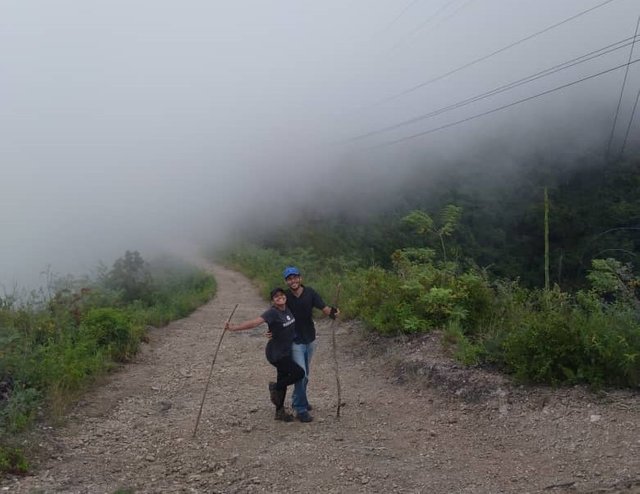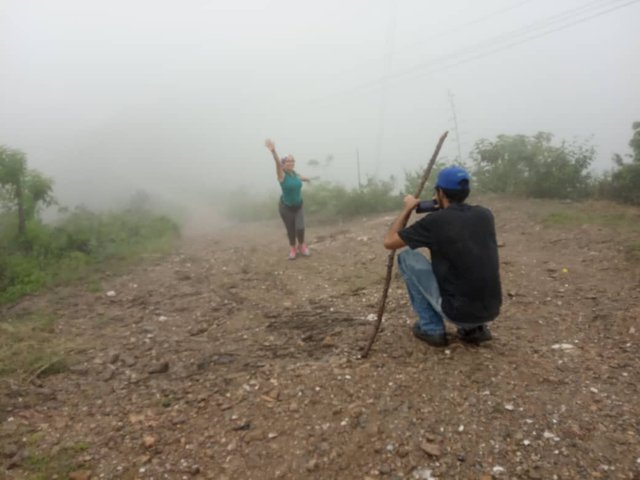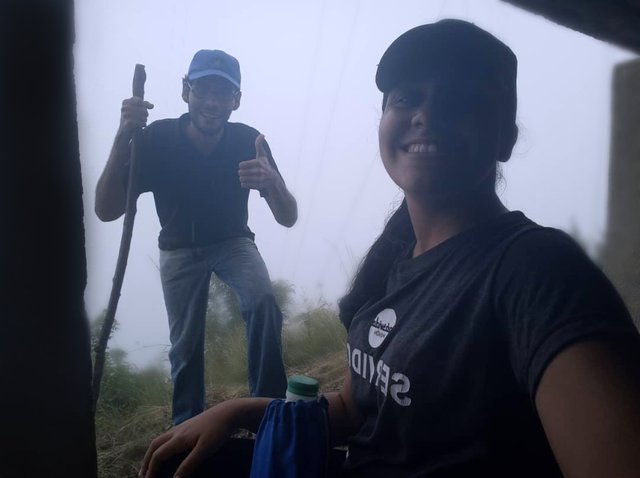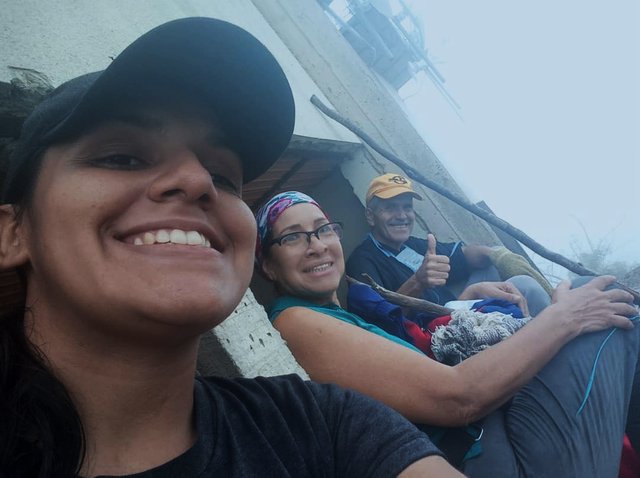¿Te gusta la zona de confort? No entres / Do you like the comfort zone? Do not enter
Can we manage body / mind / spirit in order to get out of the comfort zone and expose ourselves to achieve goals that we have not yet reached?
This came to my mind being up there with poor visibility, totally exhausted from the climb, wet from head to toe and terribly cold.

Fotografía/Picture: Xiaomi 6A Camera
Por lo general, tendemos a acostumbrarnos a una rutina y permanecer en ella, pero cuando llega algún evento que te cambia esta rutina y te obliga a salir de la famosa "Zona de Confort" simplemente nos bloqueamos, molestamos e incluso, huimos. En Coaching esto se denomina "Quiebre" o "Momento de Quiebre" y es donde las emociones empiezan a manifestarse.
Si algo he aprendido durante mis años de vida, es que es necesario aprender a gestionar las emociones para poder alcanzar los objetivos que deseamos en la vida. No quiere decir que no vayas a ser una persona exitosa o que no alcances lo que deseas si no lo haces, pero creo que se puede lograr aquello que deseas en mucho menos tiempo de lo que imaginas si comienzas a aplicar la auto-gestión emocional.
Por otra parte, en el Coaching utilizamos tres distinciones básicas que son: Corporalidad, Lenguaje y Emoción. Y a través de estas tres, como coach podemos acompañar a la persona que esté dispuesta en su proceso de auto-descubrimiento, siempre orientado a que esa persona consiga lo que realmente desea. Fíjense que hay cierta similitud con respecto a lo que conocemos como Cuerpo, mente y espíritu.
In general, we tend to get used to a routine and stay in it, but when an event comes that changes this routine and forces you to leave the famous "Comfort Zone" we simply block, bother and even, we fled. In Coaching this is called "Break" or "Break Moment" and it is where emotions begin to manifest.
If I have learned something during my years of life, it is that it is necessary to learn to manage emotions in order to achieve the goals we want in life. It does not mean that you will not be a successful person or that you will not achieve what you want if you do not, but I believe that what you want can be achieved in much less time than you imagine if you start to apply emotional self-management.
On the other hand, in Coaching we use three basic distinctions that are: Corporality, Language and Emotion. And through these three, as a coach we can accompany the person who is willing in their process of self -Discovery, always aimed at that person getting what they really want. Notice that there is a certain similarity with respect to what we know as Body, mind and spirit.

No soy un erudito en la materia, pero estoy seguro de que si logramos gestionar dos de estos tres aspectos, el tercero se va a ver modificado solo por el hecho de que somos seres íntegros. Por ejemplo, no podemos tener una emoción de alegría, cuando nuestra mente está enfocada en algo que consideramos "negativo", nuestro lenguaje es negativo, nuestro espíritu se encuentra abatido. Pues, probablemente aunque seamos muy buenos mintiendo, nuestro cuerpo va a demostrar la tristeza, aun cuando intentemos fingir una alegría con una sonrisa.
Para el caso anterior deberíamos preguntarnos si realmente el estado de ánimo actual nos beneficia en lo que queremos lograr. En algunos casos así será, y lo que debemos hacer es dejar de fingir, ser íntegros y simplemente romper en llanto y desahogarse, aceptar el proceso. Así como quizás, en otros casos por algún motivo en concreto debamos dejar atrás ese estado de ánimo para poder alcanzar lo que queremos. La cuestión es, ¿Cómo dejamos de estar en ese estado de ánimo?.
Es allí donde voluntariamente comenzamos a gestionar lenguaje, cuerpo y emoción. Podemos utilizar lenguaje en forma de pregunta a nosotros mismos de la siguiente manera:
Lenguaje: ¿Qué estoy comunicando de forma verbal?
(Afirmaciones,declaraciones,
juicios:
Nada va a cambiar, todo va a ir peor, esto es lo más horrible que me ha pasado en la vida, etc)
¿lo que estoy comunicando va acorde con el estado de ánimo que quiero en este momento de mi vida?
¿Cuáles otras afirmaciones puedo emplear para sustituir las que no me benefician?
(La vida es un cambio constante y es posible cambiar para mejor, tengo cosas positivas en mi vida como personas que me quieren o aman, todo no va ir a peor, etc)
Corporalidad:
¿Qué corporalidad estoy expresando?
(Ejemplo: Cuerpo caído, mirada baja, encorvado, etc)
¿esta es la corporalidad que realmente quiero tener? (si/no)
¿Cómo es la corporalidad de una persona con el estado de ánimo que quiero?
(Líder: Erguido, mirada en alto, pecho hacia afuera, atento al entorno y a lo que le rodea, dispuesto a actuar, etc.)
(Tranquilidad o paz: relajado, respiración lenta y tranquila, calmado, etc)
I am not a scholar on the subject, but I am sure that if we manage to manage two of these three aspects, the third will be modified only by the fact that we are whole beings. For example, we cannot have an emotion of joy, when our mind is focused on something that we consider "negative", our language is negative, our spirit is downcast. Well, probably even if we are very good at lying, our body will show sadness, even when we try to feign happiness with a smile.
For the previous case we should ask ourselves if the current state of mind really benefits us in what we want to achieve. In some cases this will be the case, and what we must do is stop pretending, be upright and simply burst into tears and vent, accept the process. As well as perhaps, in other cases for some specific reason we must leave that state of mind behind in order to achieve what we want. The question is, How do we stop being in that state of mind?
It is there that we voluntarily begin to manage language, body and emotion. We can use language in the form of a question to ourselves in the following way:
Language: What am I communicating verbally?
(Affirmations, statements,
judgments:
Nothing is going to change, everything is going to be worse, this is the most horrible thing that has happened to me in life, etc)
Is what I am communicating according to the mood I want at this moment in my life?
What other statements can I use to substitute for the ones that don't benefit me?
(Life is a constant change and it is possible to change for the better, I have positive things in my life as people who love or love me, everything will not get worse, etc)
Corporality:
What corporality am I expressing?
(Example: Dropped body, low gaze, hunched over, etc)
Is this the corporeality that I really want to have? (yes / no)
How is the corporality of a person with the state of mind I want?
(Leader: Erect, gaze up, chest out, attentive to the environment and his surroundings, willing to act, etc.)
(Tranquility or peace: relaxed, slow and calm breathing, calm, etc)

Nota personal: Si tienen a una mascota o un niño pequeño dense la oportunidad de observarlos, no hay un ser más integro que un animal o un niño. Vean su lenguaje (qué dicen), corporalidad (que manifiestan con el cuerpo), emoción (estado de ánimo) y verán que no hay incongruencia en ninguno de estos tres aspectos. Obviamente, son transparentes, ellos no gestionan o gestionan muy poco, pero si son maravillosamente íntegros y nosotros de adultos necesitamos aprender de ellos este aspecto.
Emoción:
¿Qué emoción predomina en mi vida? (Algunas de ellas: Alegría, tristeza, miedo, enojo)
¿Esta es la emoción que necesito para alcanzar lo que quiero?
¿Qué sucedería si actúo y tomo decisiones desde alguna otra emoción?
¿En cuál estado de ánimo quiero permanecer?. Estado de animo = Emoción que predomina en tu día a día
¿Cómo me sentiría alcanzando aquello que deseo?.
Algunas prácticas que pueden ayudarles a mejorar en cuanto a "Cuerpo, mente y espíritu"
Cuerpo: Ejercicios que mejoren la condición física, por ejemplo: Trotar, caminar, natación, pesas, etc.
Mente: Educarse (Leer sobre como funciona la psicología humana y la mente, PNL o programación neuro lingüística, mindfullness, etc), aprender a estar en el momento presente, auto-sabotear tu mente llevandola a limites en los cuales piensas que es imposible llegar y superarlos, salir de la zona de confort, etc.
Espíritu: Fortalecer tu parte espiritual y tu relación con aquél ser superior (Dios, Jesus, Yahveh, fe en ti mismo, etc) mediante la oración, meditación, relajación, etc.
Dicho lo anterior, con estas herramientas sé que muchos de ustedes van a poder ajustar los pequeños "engranes" para poder dar el siguiente paso en sus vidas así como yo lo hice y he continuado haciendo.
Note to self: If you have a pet or a small child, give yourself the opportunity to observe them, there is no more upright being than an animal or a child. Look at their language (what they say), corporeality (that they manifest with the body), emotion (state of mind) and you will see that there is no incongruity in any of these three aspects. Obviously, they are transparent, they do not manage or manage very little, but they are wonderfully upright and we as adults need to learn this aspect from them.
Emotion:
What emotion predominates in my life? (Some of them: Joy, sadness, fear, anger)
Is this the emotion I need to achieve what I want?
What would happen if I act and make decisions from some other emotion?
In what state of mind do I want to stay? Mood = Emotion that predominates in your day to day
How would I feel achieving what I want?
Some practices that can help you improve in terms of "Body, mind and spirit"
Body: Exercises that improve physical condition, for example: jogging, walking, swimming, weights, etc.
Mind: Educate yourself (Read about how human psychology and the mind, NLP or neuro linguistic programming, mindfulness, etc.), learn to be in the present moment, self-sabotage your mind by taking it to the limits in which you think that it is impossible to reach and overcome them, to leave the comfort zone, etc.
Spirit: Strengthen your spiritual part and your relationship with that higher being (God, Jesus, Yahveh, faith in yourself, etc.) through prayer, meditation, relaxation, etc.
That said, with these tools I know that many of you are going to be able to adjust the little "gears" to take the next step in your lives just as I did and have continued to do.

Para terminar con la anécdota, mis temores cuando subía eran enfermarme ya que la situación no está para eso por motivos que todos conocemos (gastos en medicina y días fuera de combate que no me benefician) y pues, no soy muy amante del frio que digamos. Aparte, nos esperaba un ascenso de 15 min aún y luego una bajada de por lo menos 35 min. Y pues, finalmente mientras subíamos ocurrió aquello que temía, comenzó a bajar la neblina, el frio aumentó, perdimos visibilidad y cayó la lluvia repentinamente, terminamos de subir y antes de llegar ya estábamos completamente mojados. Por un momento piensen cómo reaccionarían ustedes ante aquella situación. En mi caso, es obvio que no estaba feliz, pero pude rápidamente cambiar mi estado de ánimo, pues molestarme no iba a hacer que me secara, que dejara de llover ni que la situación cambiara, así que modifiqué mi pensamiento, simplemente deje "fluir" y vivir aquél momento que iba a ser único como todo momento en la vida y en disfrutarlo en compañía de personas que aprecio muchísimo.
To end the anecdote, my fears when I went up were to get sick since the situation is not for that for reasons that we all know (medical expenses and days out of combat that do not benefit me) and well, I am not very fond of the cold. . Besides, we still expected an ascent of 15 min and then a descent of at least 35 min. And well, finally, while we were going up, what I feared happened, the fog began to drop, the cold increased, we lost visibility and the rain suddenly fell, we finished climbing and before we arrived we were already completely wet. For a moment think about how you would react to that situation. In my case, it is obvious that I was not happy, but I was able to quickly change my state of mind, because getting upset was not going to make me dry, stop raining or the situation change, so I modified my thinking, just let "flow "and living that moment that was going to be unique like every moment in life and enjoying it in the company of people that I appreciate very much.

En resumen, fue una de las mejores experiencias que he vivido en mi vida y para terminar de completar, conseguí a un pequeño amiguito al cual, en otro momento no me hubiese atrevido ni acercar, pero simplemente me di la oportunidad de apreciarlo y ayudarlo a que la lluvia no le hiciera daño, así que lo puse en un sitio en donde al terminar la lluvia pudiera volver a su habitad.
In summary, it was one of the best experiences I have had in my life and to finish completing it, I got a little friend whom, at another time I would not have dared to approach, but I simply gave myself the opportunity to appreciate and help him that the rain did not hurt him, so I put him in a place where when the rain finished he could return to his habitat.

Si te gustó el post, por favor no olvides dejar un comentario
abajo. Pues, tu opinión es muy valiosa para mí, porque
así puedo seguir mejorando y generando contenido
de calidad y 100% original




